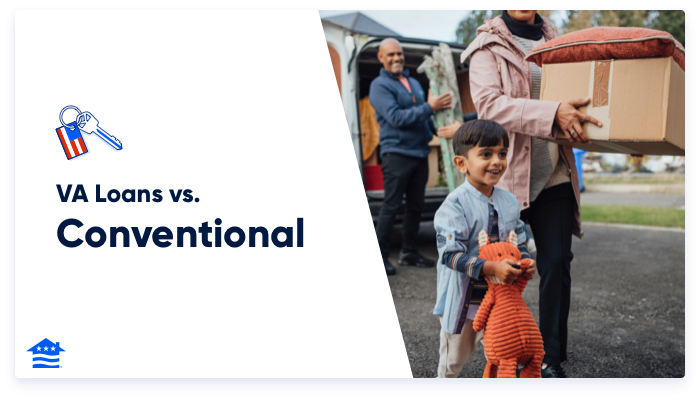Update: VA Policy on Private Roads (11/25/22)
The VA issued updated policy guidance on private roads and shared driveways in late November 2022.
Private road access agreements have long proved challenging for some Veteran homebuyers. These agreements are sometimes already covered by state law. Veterans could also request a waiver from the VA in cases where a joint maintenance agreement didn't exist.
The VA ultimately recognized the way these agreements can put undue burdens on Veterans, from creating additional expense and lengthening closing times to disadvantaging buyers in the marketplace.
Latest Guidance
As of Nov. 25, 2022, the VA no longer requires an ongoing maintenance agreement from a homeowners' association or a joint maintenance agreement among homeowners on a private road or shared driveway.
Moving forward, all that's needed is a recorded permanent easement or right-of-way to be placed in the loan file.
Here's our original story on VA loans and private roads:
Falling head over heels for a house makes the whole VA mortgage process worthwhile. But there are some important things to bear in mind if the object of your affection happens to be on a private road or a shared driveway. These aren't everyday properties, but they're certainly out there and can create a major headache for homebuyers.
Should you set your sights on a home like this, make sure you've got a solid understanding of the rules of the road, so to speak. Veterans purchase homes with shared driveways or on private roads every month. But they're not always a slam-dunk loan file.
Here's what you need to know.
Private Road Agreements
Homes in the country are often the go-to example here. But there are private roads and shared driveways in communities across the country, both rural and urban. These are basically properties you access using a road that isn't owned by the state or county. It's common for multiple people to live on a private road.
For the sake of example, let's say you want to purchase a beautiful older country house. Government-owned roads don't quite get you to the property, so there's a private road that leads not just to the house you hope to purchase but to a half-dozen others. There's no snow plowing or pothole patching on a private road, at least not on the taxpayer dime. It's up to the people who live on it to handle maintenance, snow removal, mowing and any other issue that arises.
The same concept generally holds true for two properties that share a common driveway.
So what's the big deal? At issue is the VA's concern about your long-term access to the property. That means once you're under contract on the home, an independent VA appraiser is going to take a closer look at the legal status of that private road. Lenders may also want to have a clear picture of the property's legal access in case the borrower ultimately defaults on the loan.
The appraiser will typically be looking for two big things:
- A legally recorded easement regarding right-of-way from property to public roadway
- A private road agreement that provides for continued maintenance and is signed by everyone who lives on the road
The first part doesn't usually pose much of a problem. There's often something already on file with the county, or a state statute covers the access. It's the second part that can prove much more problematic for the loan process (unless you're purchasing in California, Connecticut, Oregon or Vermont, which don't require private road agreements).
Purchasing a property that's covered by a Homeowners Association (HOA) may also provide relief from the private road issue. Different lenders can have different requirements. Generally, if the HOA maintains "common elements," no additional private road agreement or documentation is necessary because “common elements” are always assumed to include the street/roadway.
Potential Workarounds
Much as you might wish, you can't force existing property owners to sign a private road agreement. One holdout can hold up and even ultimately quash your VA home loan. But, in some cases, VA buyers may be able to work with their lender toward a satisfactory resolution.
For example, if you're buying a home close to the public road, you may be able to take responsibility for the portion of the private road from your property to the public right-of-way. But if there are homes between yours and the public road, then you might all of those homeowners to sign a private road agreement.
These scenarios are always a case-by-case basis, so talk with your loan officer and your lender in more detail about your particular situation and what might be possible.
Related Posts
-
 Using Your VA Loan for an AirbnbPurchasing a home with a VA loan is an exciting moment, but there are some limitations with what you can do with the property even after you close. Occupancy requirements are going to be the biggest hurdle for Veteran homebuyers, but that's not to say turning your home into an Airbnb is impossible.
Using Your VA Loan for an AirbnbPurchasing a home with a VA loan is an exciting moment, but there are some limitations with what you can do with the property even after you close. Occupancy requirements are going to be the biggest hurdle for Veteran homebuyers, but that's not to say turning your home into an Airbnb is impossible. -
 VA Loan vs Conventional Loan: A Complete ComparisonHere we compare the primary differences between VA and conventional loans to show you when each option may be the best.
VA Loan vs Conventional Loan: A Complete ComparisonHere we compare the primary differences between VA and conventional loans to show you when each option may be the best.


